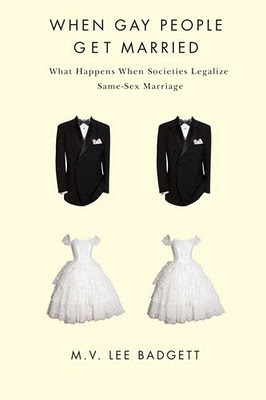 In recent years, some jurisdictions have opened up marriage to same-sex couples -- through litigation, legislation, executive action, or some combination. It hasn't always stuck, as in California where a ballot measure undid a state supreme court case (and itself is being challenged).
In recent years, some jurisdictions have opened up marriage to same-sex couples -- through litigation, legislation, executive action, or some combination. It hasn't always stuck, as in California where a ballot measure undid a state supreme court case (and itself is being challenged).What is the experience of the couples who are newly faced with the decision to marry (or not)?
M. V. Lee Badgett pursues that question in When Gay People Get Married: What Happens When Societies Legalize Same-Sex Marriage (2009)
Badgett spent a sabbatical in the Netherlands, studying same-sex marriage by interviewing couples, gathering research, and comparing countries' policies. There is an interesting range. For example, in the Netherlands, both straight and gay couples can choose marriage or registered partnership. In the US, some people argue for marriage equity so that same-sex partners can have improved access to health insurance, pensions, Social Security, and so on. But in most European countries, the social welfare system means that marriage is less important for economic security. In addition to reporting her research, Badgett also reflects on her own situation: marriage became available in her home state, Massachusetts, while she was in the Netherlands.
Interested? The book is in the Classified Stacks at K699 .B33 2009 at Classified Stacks. WorldCat record. Publisher's page (cached).
 The Brides of March: Memoir of a Same-Sex Marriage is much more personal. It is also closer to home: the brides of the title got married in Multnomah County, Oregon, when the county council decided it was a violation not to issue marriage licenses to same-sex couples, despite a state law to the contrary.
The Brides of March: Memoir of a Same-Sex Marriage is much more personal. It is also closer to home: the brides of the title got married in Multnomah County, Oregon, when the county council decided it was a violation not to issue marriage licenses to same-sex couples, despite a state law to the contrary.This memoir gives a peek at the lives of one family -- two moms and three kids -- affected by the national marriage debate. Often comic, it also conveys the pain and disappointment when the voters of Oregon voted against same-sex marriage and then the state supreme court voided their marriage.
Would you like to pick up this quick read? It's in the Good Reads collection (just east of the student lounge) at HQ1034.U5 D463 2007 at Good Reads. WorldCat record. An excerpt is on the author's website.
Of course, these aren't the only books about the controversy around same-sex marriage. See this WorldCat list for more.
 One book worth highlighting is Nancy Polikoff's Beyond Straight and Gay Marriage: Valuing All Families Under the Law. Polikoff came to the UW as a Gates Public Service Law speaker in April 2008, when her book was first out.
One book worth highlighting is Nancy Polikoff's Beyond Straight and Gay Marriage: Valuing All Families Under the Law. Polikoff came to the UW as a Gates Public Service Law speaker in April 2008, when her book was first out.In her presentation (check the Multimedia Gallery for recordings and transcript), she gave a little of the history of the legal benefits tied to marriage and asked the fundamental question: why tie this benefits to marriage and not to anything else? For instance, widows were given Social Security benefits to protect women who had been dependent on their husband's income in one-breadwinner families. Giving Social Security benefits to surviving spouses today is both over- and under-inclusive: it gives a benefit to some people who don't need it (e.g., because they have other income) and fails to protect some people who do (e.g., because they are single or were dependent on a sibling's income, not a spouse's). She said:
I see a legal system that harms unmarried couples of any sexual orientation, as well as single parents and their children, extended families, and anybody else who forms relationships of emotional and economic interdependence that aren't marriage.Beyond Straight and Gay Marriage is in the Classified Stacks at KF538 .P65 2008. WorldCat record. Publisher's page (includes interviews and reviews).
My solution is valuing all factors through matching laws that now privilege marriage to their purpose, and after that being able to include within those laws all of the different kinds of relationships that are necessary in order to achieve the purpose of the law.









